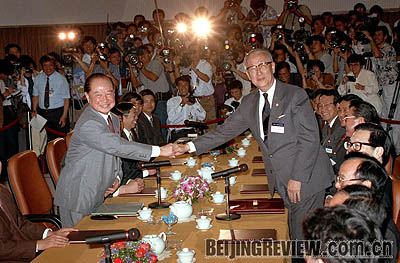|

HISTORIC MEETING: ARATS President Wang Daohan (left) and SEF Chairman Koo Chen-fu made world headlines on April 27, 2003, when they held the highest-level post-1949 cross-straits talks, in Singapore
After nine years, the Chinese mainland's Association for Relations Across the Taiwan Straits and Taiwan-based Straits Exchange Foundation, two nongovernmental organizations authorized to engage in talks on issues related to exchanges across the Taiwan Straits, resumed talks in Beijing on June 12-13, reaching two important agreements. Weekend cross-straits charter flights and mainland tourists crossing the pond to visit Taiwan are now a reality.
The breakthrough talks augur well for the development of relations across the Taiwan Straits and prompted Zhou Zhihuai, Deputy Director of the Institute of Taiwan Studies at the Chinese Academy of Social Sciences, to make several observations on this significant step and the impact going forward, in an article published by China Review News, a Hong Kong-based news agency.
Factors leading to talks
In less than one month after Kuomintang's Ma Ying-jeou took power in Taiwan, the Association for Relations Across the Taiwan Straits (ARATS) and the Straits Exchange Foundation (SEF) managed to resume talks. There were several factors that contributed to this encouraging progress.
First is the recognition of the political foundation for the resumption of ARATS-SEF talks, that is, the "1992 Consensus" on the one-China principle. This is a crucial point. As Hu Jintao, General Secretary of the Central Committee of the Communist Party of China (CPC), stressed in his meeting with Kuomintang Chairman Wu Poh-hsiung in late May that all other problems in mainland-Taiwan relations are open to discussion as long as both sides recognize the one-China principle.
Second is the sense to seize opportunities. During the rule of pro-independence Taiwan leaders Lee Teng-hui and Chen Shui-bian, they had neither the intention nor the ability to improve and develop cross-straits relations. As a result, opportunities were lost for common development and prosperity across the straits. Although some argue it's still too early to say whether Ma Ying-jeou's tenure signifies a "rare window of opportunity" for development in cross-straits relations, the will and actions to do so have become undeniable facts.
| 